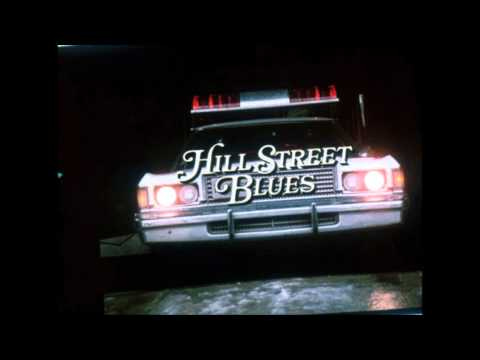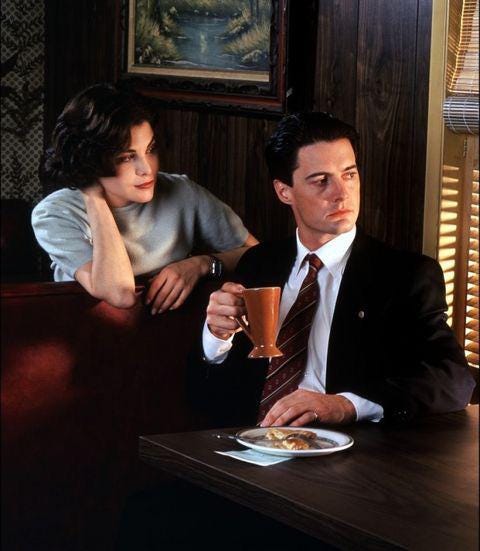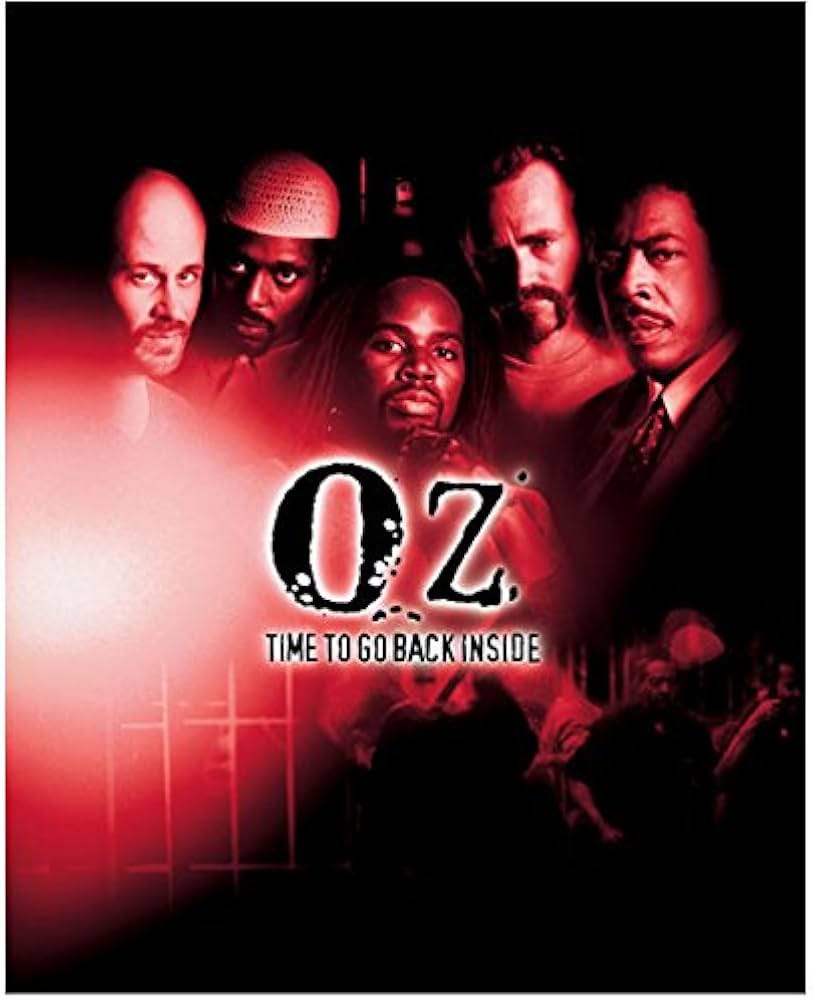The Totally Correct Anecdotal Evolution of the Second Golden Age of TV
Definitely not just one man’s insane ramblings
Y’know, the other day I was out with friends, and absolutely none of them asked me, “say John, what do you think is the anecdotal evolution of the second golden age of television?”
“That’s a very interesting question,” I said to no one in particular, since no one had asked, “and one I have very strong opinions about, so allow me to run them down for you at length.”
It was about then the table began to clear and people very quickly made excuses for other places they had to be, with people they liked better than me. That didn’t stop me from launching into a very detailed breakdown of the TV landscape as I saw it in the 80s and 90s, and I repeat it here for you, verbatim.
(Now mind you, I’m probably going to leave some shows out, and have some blank spots that I’m sure will seem obvious, because I’m not a TV historian, or even an expert on TV, merely an idiot who thinks highly of his opinions, which at least qualifies me to rant on the internet.)
Much of our modern television comes directly from that pivotal 80s cop drama, “Hill Street Blues,” about a precinct house full of cops, criminals, lawyers, and how their lives all intersected. It’s there that the producers start to break the episodic nature of TV shows. Back in the old days, TV moved at a glacial pace. Characters were created to remain as they’d been created. Most primetime shows, no matter what happened in them, reset back to the status quo by the end of the episode. If a character quits smoking, they were smoking again by the end (eg, “Columbo”). If they became addicted to hard drugs (or at least caffeine pills, eg “Saved By the Bell”), they were cured in time for next week. If somebody learned a life lesson, especially one that should’ve changed them forever, they’d forgotten about it the next week.
They were designed to be played in almost any order, with the notion that any episode might be someone’s first time watching, and a newcomer needed to be able to enjoy it as much as someone who’d been watching for years. (Also made it easier to sell the shows in syndication, which ran in all kinds of out of order.)
Also, before "Hill Street," characters tended to be more one-note. Good guys were good, bad guys were bad, and most cop shows were about good guys stopping bad guys. "Hill Street" featured different shades of good and bad guys, limited only by the network strictures and the timbre of the times. Most cops weren't superheroes, married only to the job, and dedicated to wiping out evil, they were working stiffs just trying to get through the day without getting killed. And a few of the cops weren’t much better than the crooks they were chasing.
(Now, perhaps you could argue that so-called “evening soaps” like “Dallas” and “Falcon Crest” were actually the ones that made the idea of soap opera continuity mainstream, because even though “Hill Street Blues” was watched by a lot of people, “Dallas” and “Falcon Crest” were watched by a SHIT-TON of people. And I don’t think “Hill Street” had an equivalent to the pop culture-dominating question, “Who Shot J.R.?” But to me, “Hill Street” seems the proper fulcrum, because a) the quality and substance of the writing was more groundbreaking, and b) many of the writers and producers of that show went on to create other equally-huge shows that continued the thread of quality TV. Also because my mommy liked that show better. However, if you prefer, whenever I say “Hill Street Blues,” just imagine I’m saying “Dallas.” See? Compromise.)
Anyway, “Hill Street Dallas” was the first show to expect the audience to keep up with character development, plot twists, and general continuity changes over the course of episodes, and seasons. (With, again, the exception of soap operas, who had been doing it for decades, credit where credit is definitely due.) It inspired other shows to dip their toes into some light continuity, yer "Moonlighting," yer "Miami Vice," yer "St. Elsewhere," yer "L.A. Law"... even shows like "Cheers" and "The Cosby Show" have slight character arcs and changes to their landscapes, which wasn't that common in sitcoms (at least, that didn't have children as the stars, where you could see the month-to-month physical development). Which also led, in turn, to the late 80s sitcoms with a little more sass - the "Seinfelds" and "Simpsons" that have become the cornerstones of modern comedy.
(I’m sure you could argue all modern sitcoms and probably some dramas evolve directly from “M.A.S.H.,” which preceded “Hill Street” by some years; I’d respond by saying M.A.S.H. was largely episodic and not continuity-heavy, but if you prefer to start there because the writing was good, by all means.)
But there is a show I believe everything in the 90s and beyond hinges on, and I'm sure you've figured out where I'm going. The true pivot point between the previous age of TV, and the modern age.
The list of people who worked on "Hill Street Blues" is a who’s who of future groundbreakers, Stephen Bochco, Dick Wolf, David Milch, Anthony Yerkovich, the list goes on. So, one of those writers, Mark Frost, gets it in his head that people can follow complicated TV shows just fine, despite what network TV execs insist. Things don’t need to stay frozen in amber, characters can change, to tell a fuller, richer story.
Well, he takes that notion, and a few years later, teams up with a famous film director, and they create theyselves one of the biggest pop culture phenoms to hit the TV screen, “Twin Peaks," the show that posed the next great pop culture zeitgeist question, "Who killed Laura Palmer?" A popular teenage girl is found dead on a beach, wrapped in plastic, murdered by an unknown killer. In true mystery fashion, everyone in the town seemed to have a motive, so everyone was a potential suspect.
"Twin Peaks" hit TV like a bomb, and instantly changed the landscape. First and foremost, the show was directed and co-written by David Lynch, a filmmaker who had gained accolades a'plenty for his insane lunatic movies, “Eraserhead,” “Blue Velvet,” and “Dune.” Til then, prominent filmmakers actively avoided working in TV. It was considered a place where more famous actors and filmmakers went to retire or die, and once you were in TV, you were stuck there. So for Lynch and Frost to convince a plethora of movie actors to slum it in TV was a really big deal at the time. Nowadays, of course, TV and movies can be interchangeable for cast and crew, but back then, it really was not where famous people wanted to end up.
Add to that, the writing was top-notch (for awhile, anyway), the characters were weird, quirky, dark, and in many instances, not all that likable, but still incredibly fascinating. Everyone had their own story, everyone had specific motivations. The style was a combination of 50s chic and modern gothic horror. And each episode took place in a single day, one after the other, and the audience was expected to keep up with the changing events.
Well, dude. This shit was unlike almost anything audiences had ever been asked to deal with before. Very few shows glued their narratives end to end. It was just sort of expected in regular shows, during the week the audience was away, a week passed in the characters' lives, and you rejoined them in progress. It allowed everyone, the characters and the audience, to take a minute to catch their breath. But on "Twin Peaks," the engine was chugging full tilt, all the time. There was no narrative let up, no release of tension. Everyone was in trouble, all the time. Even when they made fun of the notion of soap opera cliffhangers at the end of the first season by putting absolutely everyone in life-threatening danger, it was just a continuation of the show's weekly mission statement, ratcheting the tension and story to a new level.
Audiences loved it. For a minute. It was the most talked-about series on TV. It was only when the audience realized that the creators had absolutely zero intention of deflating the tension of the show, by not revealing Laura Palmer's killer in the first episode of the second season, that people tuned out in droves. “Twin Peaks” went from hero to zero overnight.
But the damage had been done. People liked continuing narratives in their TV, it turned out. And not a few creative types saw what Lynch and Frost had done, and said, "Saaay, I wanna do that too!" So you start to get more shows experimenting with ongoing narratives.
Not all at once. A lot of these shows were genre shows, in syndication, or on the fledging networks like Fox (and down the road, the WB). Stuff like "Star Trek: Deep Space Nine,” "Babylon 5," and suchlike. The biggie of this bunch is of course “X-Files,” which started a creative revolution all its own. Might even say it split the road and started its own path down Genre Lane, but that’s too complicated for me, so suffice to say it was incredibly popular.
Pretty soon, things start to pick up creatively, and you're seeing a goodly number of shows that hadn't quite been tried before. "NYPD Blue," "Homicide: Life on the Street," "Crime Story," "My So-Called Life," "Ally McBeal," "Picket Fences," "ER," the list goes on. These shows start the mainstream deep-dive on character and continuity. Some, like “Profit” and “Murder One” are creative high-wire acts, but most are shows and characters we've seen before, now allowed to spread their wings a little bit. Show a little grime under the fingernails. Heroes had flaws, villains had emotions. The most popular shows are still mainly one-and-dones like "Law & Order" and multi-camera sitcoms, where the audience can still watch in any order, and not have to keep up. But even those shows are pushing the envelope a little more: more blood, more sex, more danger, and protagonists that didn't shine as bright as the sun.
At this point, studio execs are flinging shit everywhere, painting every wall with feces to try and figure out the audience. For every "Homicide" that sorta scrapes by for seven years, there's shows like "Robbery Homicide" and "The Beat," two shows that barely got a few episodes to try something new, and were yanked off the schedule, and shoved down the memory hole forever. Try finding them now. No, really, please try, and when you find them, let me know where they are, I’d love to see them again.
So we're well into-second generation 90s stuff. "The West Wing," "Buffy the Vampire Slayer," and all their "Dawson's Creek" and "Party of Five" cousins. Not every show is a winner, but the characters are definitely not the same people from episode 1 to episode 100. Still, the exciting stuff is mostly happening on network TV. You might have the occasional "Larry Sanders Show" or "Tales From the Crypt" on HBO, but mostly, cable isn't quite catching up to the networks yet when it comes to story and character. They're more focused on the sex and blood.
Which leads me to the turning point of the late 90s, the one that truly kicked off the Golden Age of Television, and bookends this transformative period.
No, not "The Sopranos."
That’s the one people THINK started it, but that show was a year or more late to the party.
No, "It’s Not TV, It’s HBO" really started with the prison drama “Oz," a look inside the walls of one of the most violent and scary maximum-security prisons ever imagined. Think "Sopranos" is dark? A dude got burned alive in the pilot of "Oz," and it just got worse from there. “Oz” certainly had continuity - you had to be able to keep up, because long before "Game of Thrones" was killing characters off with wonton abandon, "Oz" was slicing and dicing its protagonists on a weekly basis. The Season Five cast looked almost nothing like the Season One cast.
But more than that, the audience was asked to follow and perhaps empathize with the most disgusting, down-in-the-dirt killers, rapists and degenerates they could cook up. Tony Soprano gets a lot of well-deserved attention for being an early HBO anti-hero, but in "Oz," they were ALL anti-heroes. Actually, straight up, you could just say there were no heroes, just different levels of villains, trying to survive. The great J.K. Simmons had a big early role, as a terrifying neo-Nazi, which at the time seemed almost like a cartoon villain, nowadays, not so cartoony.
Now, I'm not foolish, it's obvious that "The Sopranos" left a far bigger footprint on the landscape, and Tony Soprano deserves all the critical praise heaped upon him. But "Oz" tried all the tricks first - graphic sex, bloody violence, disgusting protagonists, kicking open the door to what cable was capable of. What "Oz" shoved in your face, "The Sopranos" did a little more... quietly. "Oz" brought the noise, "Sopranos" brought the subtlety.
(I couldn't afford HBO in those salad days, but I was lucky in that my mom would tape "Oz" on VHS, and send them to me, so I got to keep current on all the mayhem and murder. And I'm pretty sure that on one of those latter-day tapes, she included an episode of "The Sopranos.” Both shows quickly became must-see to me.)
Once "Sopranos" was out there, then sky was the limit. Cable began an arms race of amazing television - "The Wire," "Breaking Bad," "Game of Thrones," "The Shield,"
”Battlestar Galactica,” "Mad Men," and all the rest. And even though network TV couldn't keep up with the boobs and bloodshed, they were trying everything they could to get their own heavy-continuity series - "Lost," “Heroes,” “Fringe,” “Alias,” the list goes on. (Special award for “24;” where “Twin Peaks” did consecutive days, “24” pushed it to the final frontier by spotlighting consecutive hours, a single day in a season), the list goes on.
TV’s second, and, one might opine, superior Golden Age had begun, and the bar was jacked incredibly high. Shows that would’ve been the best thing you’d ever seen, had they come out twenty years earlier, were just par for the course. I mean, imagine a perfectly decent show on today… sake of argument, let’s say “Dark Matter,” an Apple TV show I enjoyed and is very smart, but probably not going to go down in history… that show would be one of the best things you’d ever seen in the mid-90s. But, being as it’s a show from the here and now, it’s just… part of the landscape.
Which is cool, yeah? That we have shows with quality so high, and yet, they’re kinda the expected standard?
So, next time you’re out with friends, and want to give them the definitive, absolutely not just one man’s opinion on this topic, hit ‘em with this knowledge. Guaranteed to clear the table quickly so you can go home and watch TV.
Podcasts! On “The Hold Up,” for September we’re doing “Gladiator!”
And at long last, we have a new episode of “Sensory Overload!”
© 2024




